Death Stranding: Starting tips
This page of the guide to Death Stranding has starting tips. In this chapter, we discuss various mechanics encountered within the first hours of the game. Some of them may be unclear or problematic - we have paid special attention to them.
This page contains mainly general tips. If you are looking for more information on a specific topic, check the individual chapters from the Guide and FAQ sections.
- Start the game at normal or high difficulty
- Remember that the controlled character moves in a realistic way
- Use methods to deal with frequent loss of balance
- The scanner makes it easy to find interactive objects and loot...
- ...and also allows you to locate the so-called Beached Things (BTs)
- Don't try to fight BTs at the beginning
- Check the depth of the river before getting into it
- Instead of entering the river you can use a ladder or a bridge
- Beware of the abysses, especially while riding a motorcycle
- You can place cargo on some vehicles
- Pay attention to the health (blood) gauge and Sam's stamina
- You should also return to your Private Room every now and then.
- Always have stocks in the inventory
- Save the game before each more challenging part of a mission
- Try to deliver the cargo in the best condition
- If possible, stay online all the time
Start the game at normal or high difficulty

Death Stranding isn't very demanding, and you don't need to be afraid of big problems when you fail an order or kill the main character. In the worst case, you will lose some time or receive a worse reward. The game also saves your progress rather frequently.
When you start a new game, we recommend that you choose the normal or high difficulty. The normal level offers the most balanced gameplay - the game shouldn't cause many problems but you will still have to watch out, for example, when transporting cargo or encountering monsters. The high level is a better choice if you want to have a survival experience. Luckily, the difficulty level can always be changed in the menu. The level you chose at the beginning isn't a permanent decision.
Remember that the controlled character moves in a realistic way

This is very general advice, as it concerns almost all aspects of moving around the game world. Sam isn't as agile as the heroes of many other adventure games and he doesn't move with disregard to the laws of physics. The hero can easily stumble, slip, lose his balance or fall. In addition, you should know that Sam can't always immediately stop on the spot. This is especially true when going down the hills - Sam can gain momentum and need time to stop moving completely.
Try to move slower than your instinct tells you. Never forget that you are carrying cargo on your back - falling can damage it. It is better to carefully go through each part of the map without taking unnecessary risks. You should also remember that you have different paths leading to the goal - if, for example, climbing on the top of a mountain seems risky, then you can look for a different path and go around the hill.
Use methods to deal with frequent loss of balance
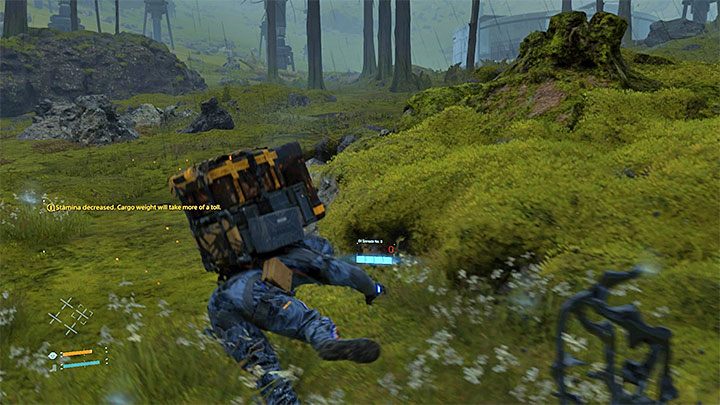
In Death Stranding, you are dealing with a variable center of gravity - carrying more cargo on the back will shift the center of gravity (the same goes for cargo stacked up to look like a "tower"). This increases the risk of losing balance and falling down. This may cause damage to the transported cargo or scatter it around the area. You can avoid this problem in several ways:
- Arrange the cargo in the right way. Don't "pack" everything on the back - this tower can easily tilt to the sides. Try to attach smaller cargo to the upper and lower limbs of the hero, and place them in containers on the belt.
- Hold L2 and R2 while traveling. If Sam doesn't hold anything in his hands, holding these buttons will make him grab his backpack. This is very useful in maintaining the stability of the cargo - you won't see it tilt to the sides that often.
- Use the Power Skeleton as soon as it is unlocked (you get it during the main storyline). This is the best version of the exoskeleton for transporting cargo. Wear it to significantly increase the load capacity limit - you won't have to worry about losing your balance because most of the cargo carried during the missions aren't that heavy.
The scanner makes it easy to find interactive objects and loot...
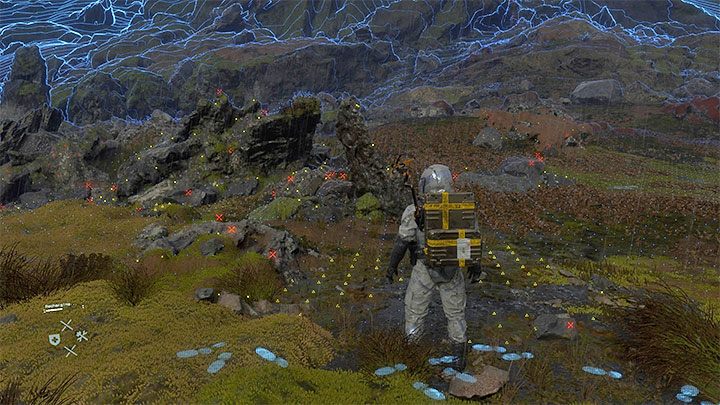
The Terrain Scanner doesn't have any disadvantages. This gadget is available from the beginning of the game, and you can use it without restrictions. No need to fear that performing a scan will consume any resources, or that you will be detected by opponents. You can also use the scanner in almost any situation, even while driving a vehicle or exploring dangerous locations.
We recommend developing a habit to activate the scanner every few hundred meters or after a few tens of seconds. The scanner can discover various types of objects:
- Crafting materials - You can find Chiral Crystals or boxes with Recycle materials.
- Containers with loot - This can be, for example, various types of weapons, gadgets, or cargo suitable for transportation to a specified location. Most of these objects are found in hostile camps (e.g. occupied by MULE), or those left or thrown out by other players.
- Interactive structures - These can be objects left by NPCs, structures that you have built yourself, or those made by other players. Each of them can be very useful (e.g. in restoring the battery or in hiding from Timefall).
- Ladders and climbing anchors - These items are left mostly by other players meaning they appear only while you are playing online. Reaching "ready-to-use" ladders and climbing anchors allows you to continue your journey without using your own items.
...and also allows you to locate the so-called Beached Things (BTs)
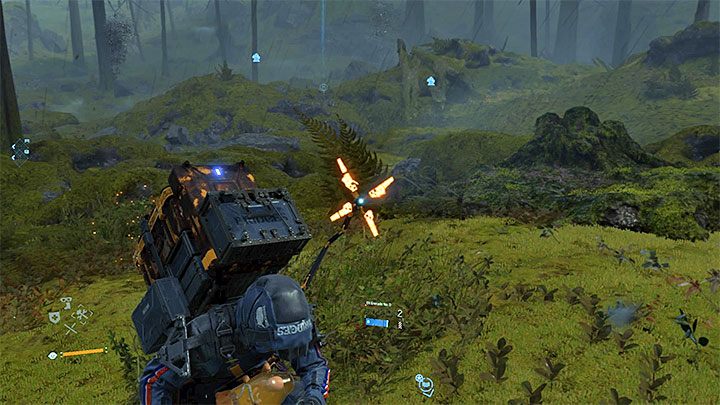
BTs are invisible monsters, which can be encountered during the exploration of the game world. The scanner activates automatically when a BT is approaching you. Also, the way it functions change significantly - you don't need to send "impulses". Instead, the antenna turns in the direction of the nearest monster. Thus, you can determine the location of the creatures to get around or chase them away (with a grenade).
It is worth noting that once you are near a BT, the color of the antenna will change to orange. You will also see a silhouette of a levitating monster - the antenna will stop it from being completely invisible to Sam.
Don't try to fight BTs at the beginning
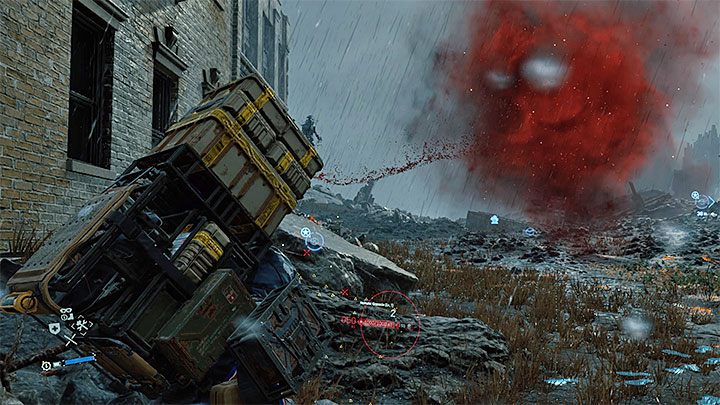
After detecting a BT, you may wish to attack the monster, but Sam is initially helpless. You can't damage BTs in hand-to-hand combat, and you don't initially have gadgets that can do real damage to them. Sneak and avoid BTs as much as possible by keeping a safe distance. If you get detected, try to escape and be ready to free yourself when Sam gets captured is goo.
The first item (out of several unlocked throughout the game), which allows you to neutralize BTs is Hematic Grenade. From now on, you don't have to rely only on stealth. You can throw grenades at monsters to get rid of them and collect the crystals dropped by them.
Check the depth of the river before getting into it
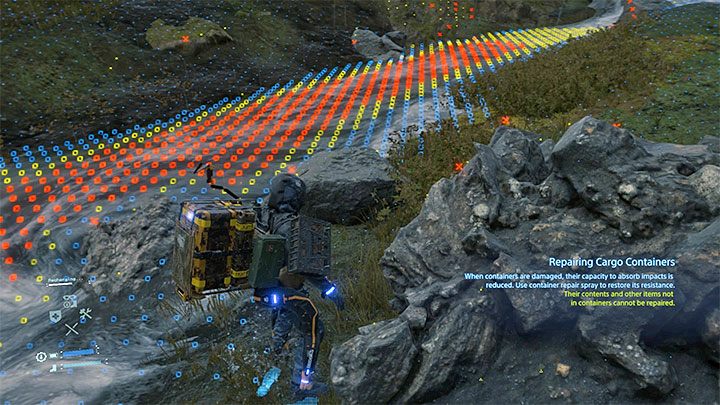
In Death Stranding, there are many moments where a river separates you from the destination. However, you shouldn't rush into them carelessly. Use the scanner to check the depth of the riverbed. Blue means that the depth is safe. Yellow means that Sam will submerge partly and will need to fight with the river (Hold L2 and R2, and stop after a depleting the majority of the endurance bar).
Red means it is too deep. If you go into the river in such a place, the main character will lose his footing and start moving with the stream. You will lose some of the cargo - you can get the items after they fall down the river.
Instead of entering the river you can use a ladder or a bridge
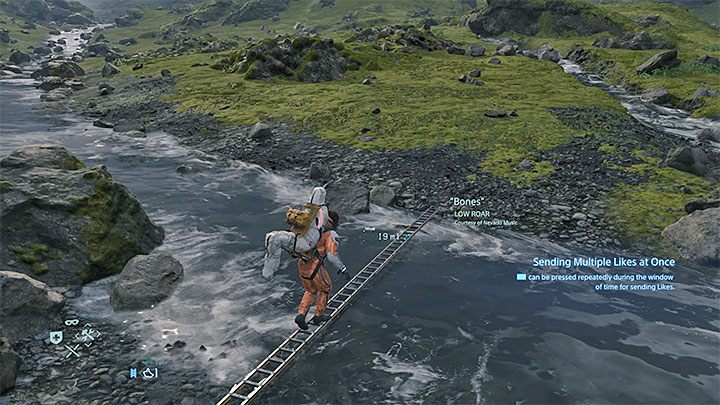
Fortunately, entering the river is never mandatory. In addition to finding a completely different path to your destination, you can also use a ladder or build a bridge across the river. A ladder is the best option for crossing small rivers. A bridge is useful only in the case of large rivers.
An important hint is that you can often come across ladders and bridges left by NPCs or other players. It is definitely worth using them - you won't waste your own PCC or resources (to build a complete bridge).
Beware of the abysses, especially while riding a motorcycle
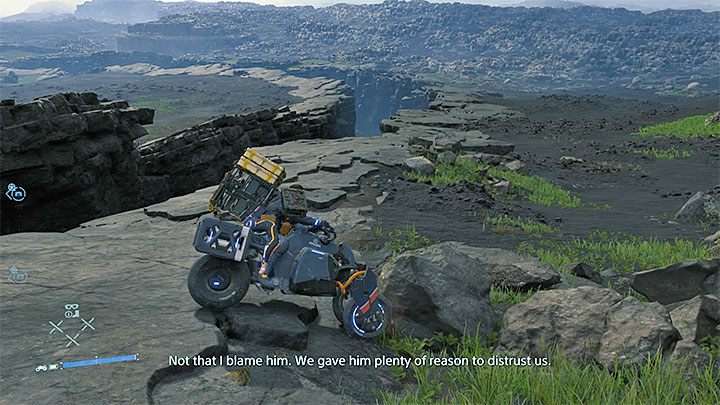
In Death Stranding, you visit a lot of mountain areas. This means that, in addition to climbing, the hero must pay attention to places where you can fall from a great height. It may end with Sam's death or, at best, the loss or serious damage to the cargo. You should pay special attention for chasms similar to the one presented in the picture. They can suddenly appear on areas that look relatively flat. Sprint and use a vehicle's booster only when you are sure that there is no abyss or pit in the vicinity.
If you drive a motorcycle, you may want to jump over a chasm or a pit. Jumps often end in failure - even when you use a booster, your motorcycle won't gain enough speed. We advise you to do this only if the "ramp" is clearly higher than the planned landing site and the chasm ahead is rather small. In all other cases, search for a roundabout road and look for bridges.
You can place cargo on some vehicles
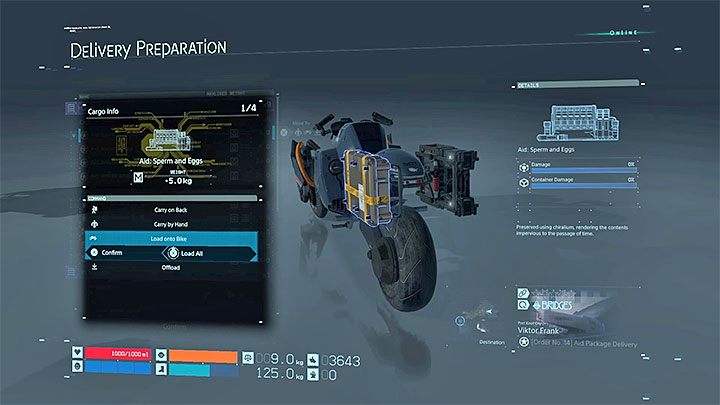
After reaching a certain point in the main storyline, you unlock motorcycles and other vehicles (including four-wheelers). Thanks to them, you will be able to travel faster but also make the main character carry less cargo. The game allows you to place transported cargo on vehicles.
Unfortunately, this mechanic isn't without drawbacks - some motorcycles don't have room for containers, because they are equipped with, for example, additional batteries. Vehicles also have a load capacity limit - exceeding it can significantly increase battery consumption or, in extreme cases, immobilize the machine.
Pay attention to the health (blood) gauge and Sam's stamina
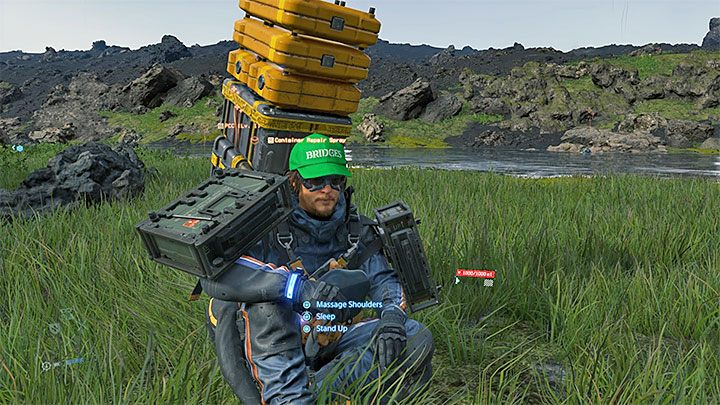
Both gauges are very important. If the blood drops to zero, Sam will die. If the stamina gauge drops to zero, Sam will run out of strength. In the case of stamina, you will notice the negative effects sooner. As the gauge depletes, you will notice that Sam is moving slower. He will also start losing his balance easier. Notice that the stamina gauge can shrink automatically. To restore it to its full state, you need to visit the Private Room described below.
Eating Cryptobiotes is the easiest way to restore health (these are the small living creatures found in the game world). You can also use Blood Bags (the game unlocks them along with Hematic Grenades). You can restore your stamina easily by drinking water from a canteen and by stopping and sitting down to rest. After the sitting down, you can also choose to stretch your muscles and take a nap to improve the recovery process.
You should also return to your Private Room every now and then.
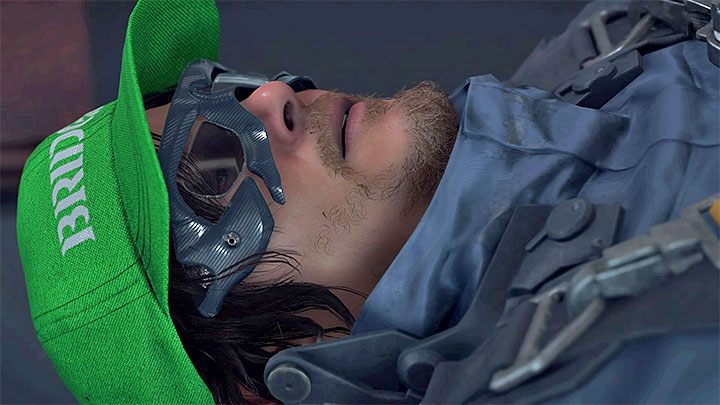
For the record, you can find a Private Room under each larger allied location, that is, one that has an elevator traveling underground. In the later parts of the game, you will also be able to place or find shelters with the same option.
The main advantage of returning to a Private Room is a good rest, which means that health and stamina will be restored fully. However, visiting a shelter has other advantages, but some of them are added as you progress through the game - you can, e.g. save the game automatically, heal BB (Bridge Baby) from autotoxemy, use a fast travel option and get special grenades using the shower and toilet.
Always have stocks in the inventory
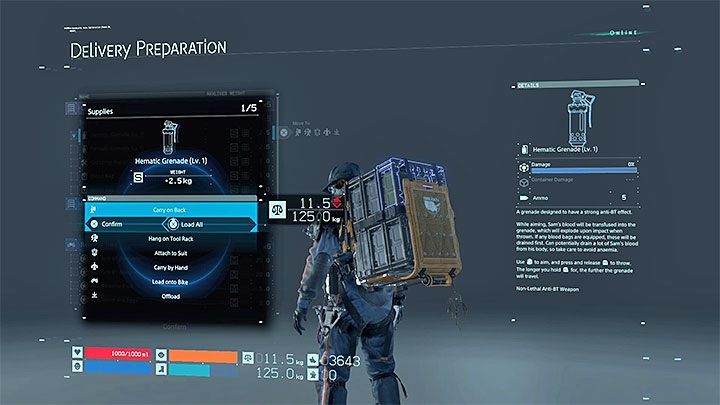
In Death Stranding, some orders can take several tens of minutes - this can be caused by factors such as difficult terrain or a long distance to overcome. In addition, Sam can always find in unexpected trouble. Below we have compiled a few of the most important things to have with you:
- Cryptobiotes and the Blood Bags - Use them to restore full health.
- Ladder and Climbing Anchor - They will help you if you come across, for example, a wall for climbing and there is no any objects of this type left by other players.
- PCC - Useful when you need to place a large object, such as a generator.
- Weapons / gadgets to fight MULE - You shouldn't have problems with running away from them (especially when you are traveling by a vehicle or using an exoskeleton), but they still can surprise you or stay in an area related to a mission.
- Weapons / gadgets to neutralize BTs - We are talking primarily about Hematic Grenades, although in the further stage of the campaign you will get other "gadgets" useful in fighting monsters.
- Container Repair Spray - It is good to have at least 1 piece. If the containers with a quest item are severely damaged, e.g. by a fall or Timefall, you will be able to repair them.
- Shoes - Always equip Sam with the best shoes and try not to have their durability go down more than 50 percent.
Save the game before each more challenging part of a mission
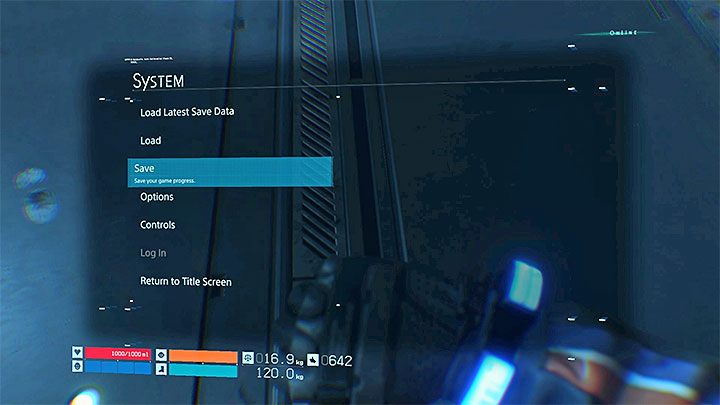
Death Stranding isn't a game in which you die a lot, but despite that, saving the game frequently is a good idea. The saving system doesn't have any limitations, but the game won't allow you to create a save if Sam is in immediate danger or is driving a vehicle (you need to get off that vehicle first). We advise you to create new saves:
- Before entering a location with BTs - It is very easy to make a mistake while sneaking. If you walked for a long period of time and the antenna has activated, leave this location to unlock the option to save.
- Before approaching a MULE camp - It isn't always easy to determine that there are MULE in the area. However, if you have the opportunity, then making an additional save can be useful, for example, in case they managed to stop your vehicle or when they knocked Sam out.
- Before starting a more difficult climb - It is easy to make some mistake and, for example, slip off a shelf, topple over, fall into a rushing river or, at worst, fall into an abyss.
- Before starting a battle with a boss - Clashes with larger and stronger opponents were described in the Bosses chapter and in the walkthrough section. If you know that you are about to start a boss battle, make a save and leave all the items that can get damaged. You should also equip items that can damage a boss (grenades, weapons, etc.).
Try to deliver the cargo in the best condition
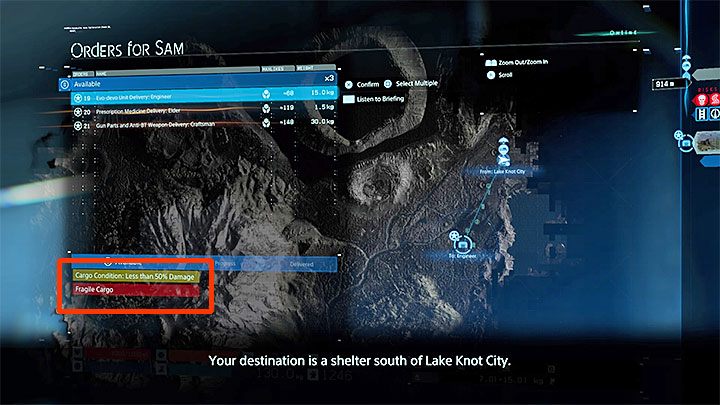
In Death Stranding, you don't simply transport cargo from point A to B. It is always necessary to deliver cargo to its destination in the best possible condition. You can learn about the desired cargo condition when you are accepting an order. The sender can request the cargo to be delivered in good condition - the example in the picture above shows that the cargo gets damaged easily and that the damage shouldn't exceed 50%.
During the journey, avoid falls because they can damage the cargo. Each carried cargo is described in the inventory by two energy bars. In addition to the cargo bar, you also have a bar for the container in which the cargo is stored. Containers can be repaired by using container repair spray - this helps you reduce the risk of damaging the cargo. This spray, however, always repairs only the container, never the cargo. It is worth adding that exceeding the damage value listed in the order description (in our example 50%) doesn't mean that you the order is failed. You can still deliver the cargo, but you will get fewer likes as a reward. The only way to fail an order is to reach 100% cargo damage.
If possible, stay online all the time
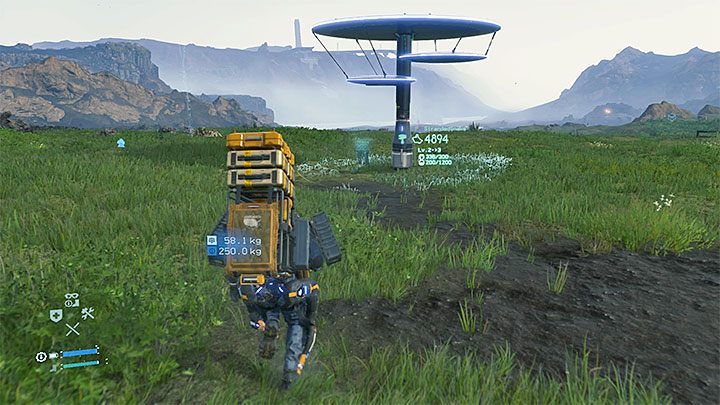
Death Stranding doesn't force you to play in multiplayer mode, but playing online has many advantages. Stay online as often as you can. In case of loss of connection with the game servers, try to reconnect - this can be done from the pause menu (the System tab).
In the online mode, players can give each other likes. The more likes you get, the more objects and items from one player's world will appear in the other's. This way you can accumulate more loot and encounter useful structures, such as for climbing (bridges, hooks, ladders, etc.).) can recuperate (shelters, temporal shelters, generators, etc.).
- Death Stranding Guide
- Death Stranding: Game Guide
- Death Stranding: Basics
- Death Stranding: Vehicles and means of transport
- Death Stranding: Standard orders
- Death Stranding: Character stats
- Death Stranding: Fighting with MULE (living opponents)
- Death Stranding: Starting tips
- Death Stranding: Building
- Death Stranding: Fighting Beached Things
- Death Stranding: Safe houses & hideouts
- Death Stranding: Basics
- Death Stranding: Game Guide
You are not permitted to copy any image, text or info from this page. This site is not associated with and/or endorsed by the developers and the publishers. All logos and images are copyrighted by their respective owners.
Copyright © 2000 - 2026 Webedia Polska SA for gamepressure.com, unofficial game guides, walkthroughs, secrets, game tips, maps & strategies for top games.
